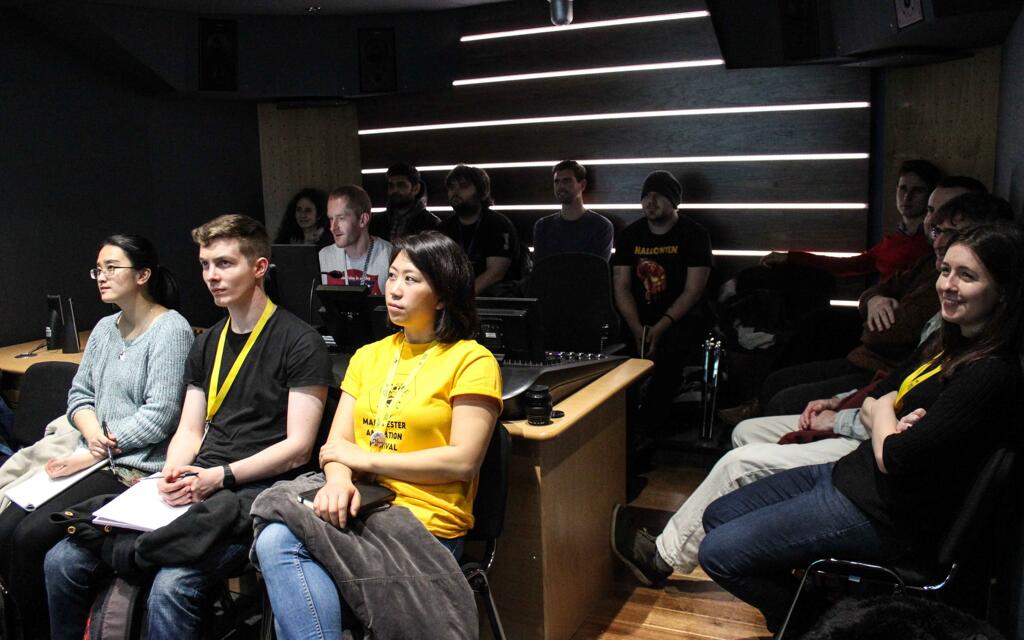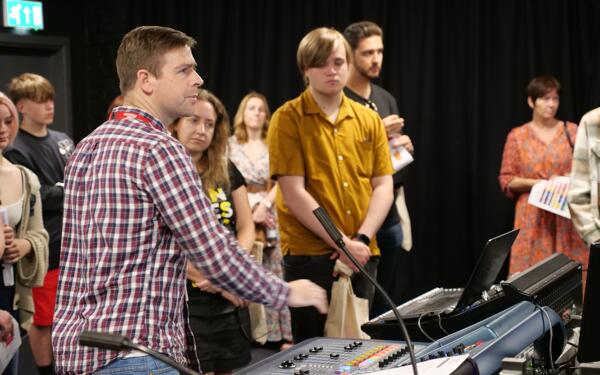 22
Jun
22
Jun
Our next Open Day
Saturday 22 June 12PM-4PM
Open Days are a great opportunity to find out more about our courses, meet our expert tutors and see our facilities in action. They're the perfect introduction to student life.
Book your placeIs it your dream to record up-and-coming talent in the studio? Are you looking to work as a live sound engineer at your favourite venue? Does touring and living on the road make you excited to join the industry? No matter your career aspirations, BSc (Hons) Live Sound Engineering and Music Production will help develop your technical knowledge, skills and make you an invaluable live audio professional.
With lessons taking place in our on-site live venue and studios, your learning is as hands-on as it gets. In the studios you’ll become confident in running recording sessions, liaising with artists, and mastering industry-standard equipment. In the venue you’ll gain in-depth knowledge of PA systems, stage monitoring and live event production. All underpinned by an understanding of acoustics and principles of sound.
If you love live sound and audio engineering as much as we do, this course will teach you how to produce and deliver the highest quality audio for a range of different platforms and user experiences.
Awarded by

Have any questions or would like to tour our studios? Get in touch
If you’re unsure whether you want to head into the live sound sector or remain in the studio, this course offers a 50/50 split. You’ll gain the technical skills required to succeed in both settings, giving you the flexibility to forge a career path directly inline with your interests.
Designed in partnership with Solotech as a tribute to one of the industry’s most talented live sound engineers, our Charlie Jones Live Venue provides enviable technical credentials. This is the perfect environment to get hands-on experience mixing and recording bands live and hosting events.
Your programme leader, Paul, is the technical manager at the O2 Ritz and still tours with a range of artists. You’ll benefit from his years of experience, connections and up-to-date knowledge of industry trends and techniques.
Your career development is at the heart of our teaching. Throughout your time on the course, you’ll develop a range of soft and hard skills relevant to your chosen career path. By providing you with opportunities to undertake work placements as part of your degree, as well as a level 2 BSC certification, you’ll graduate with an enviable CV.

All of our courses are constantly evolving to ensure teaching and learning remain relevant and up to date. Here is the latest example of the curriculum for Live Sound Engineering and Music Production:
Introducing you to the world of live sound, you’ll be working throughout this module with industry standard software and equipment in our on-site live venue. Covering everything from live signal flow and mixing consoles, on-stage microphone techniques and in-ear monitor systems, to PA components and mains distribution, this the perfect starting point for you as a live sound engineer.
Assessment: BSC Health and Safety Level 2 Exam, signal path test and practical test with technical specification. 40 credits.
Providing you with a strong foundation of studio recording skills, this module will introduce you to standard techniques and procedures used in professional recording sessions. Learning through practical sessions in our studios, your study will cover the technical aspects of capturing good quality audio including signal flow, analogue mixing consoles, microphone types and techniques, and how to improve sound sources. Progressing from simple recordings to larger sessions with several artists, you’ll learn the essential skills of planning and running a session, as well as how to get the best from a performer.
Assessment: Signal path test and portfolio of recordings with a written reflective element. 40 credits.
Introducing you to the physics, characteristics and fundamentals of sound, the knowledge you gain during this module will be used to inform almost all of your decisions as a professional engineer. From frequency and amplitude, to phase, harmonics and psychoacoustics, you’ll learn the key aspects of audio theory and how to apply them in a practical setting. You’ll also be introduced to fundamental DAW skills so that you cab develop confidence in manipulating and editing audio.
Assessment: Written test and presentation. 20 credits.
With a focus on critical listening and analysis skills, alongside career and employability issues in today’s creative industries, this module will help you set and follow a Continuing Professional Development plan to enhance your skills and give you the best chance of success in the industry. This module also teaches you essential academic writing, presentation and research skills that you’ll use throughout your degree course and in your interactions with employers or clients as you move into the industry as a creative professional.
Assessment: Presentation and CPD portfolio. 20 credits.
Introducing you to digital networked audio systems within live sound, you’ll learn to plan effective network solutions for sound at a live event. Using industry-standard software, you’ll gain experience in digital protocols and connectivity, while developing skills in designing audio networking systems, sharing audio inputs between multiple zones at a live event, and gain-sharing between FOH and monitor systems.
Assessment: Network design project. 20 credits.
Building on previous knowledge, this module will enhance your skills in live audio project planning, sound checking, PA voicing, stage monitoring, audio processing, front of house (FOH) mixing techniques, and troubleshooting. You’ll explore more advanced workflows on digital live sound consoles within the context of current industry standards and professional practice, and in preparation for a live event that you will manage.
Assessment: Organisation of a live event and a technically rehearsed live mix. 20 credits.
Progressing into our more advanced studios, and through the use of signal processing, EQ and dynamic controllers, you’ll expand on your existing recording skills and build your knowledge in professional mixing techniques. You’ll learn to identify issues and correct them using timing and pitch correction tools, as well as exploring the creative possibilities within mixing and developing your own individual production style.
Assessment: Mix portfolio. 40 credits.
This module offers you the chance to investigate and develop a self-directed project, related to an area of professional practice of your choice. The module can be seen in a wider context throughout your degree programme, and the project identified in this module can be built on work you developed in the first year of the degree. The outcome of this Research Project module could be refined further in any final year project.
Assessment: Essay. 20 credits.
As part of your own career development, and with support from your tutor, you’ll undertake a period of work placement within a professional environment in the creative industries. You’ll be encouraged to think critically about your professional practices and performance in both planning and execution, whilst learning about self-employment, networking, managing an online profile, professional communication and event planning.
Assessment: Work placement and portfolio. 20 credits.
Focusing on the role of system technician, you’ll build on your knowledge of PA systems, exploring current PA design concepts, to work towards designing one of your own for a real venue. You’ll consider a number of factors that will affect the resulting sound: from acoustics, frequency balance and environmental factors, to client specifics such as noise sensitivity and audience coverage.
You’ll get to grips with the requirements of professional PA systems, learn to safely rig and derig line array systems, and set up RF monitoring systems. You’ll also develop your live engineering skills to professional standards, culminating in a time-pressured line check, soundcheck and live mix delivered efficiently and effectively on advanced consoles.
Assessment: PA design project and live event. 40 credits.
This module will focus on a range of advanced recording, processing and production techniques and employ more professional and complex equipment to enhance your employability skills. Based around Spirit Studios’ most advanced recording and production facilities, you’ll learn how to record complex sound sources like strings, ensembles and grand pianos, and mix in large format studio environments combining both digital and analogue techniques. This module will develop your critical listening skills to a professional level and expand your career portfolio.
Assessment: Record and mix assignment. 20 credits.
Taking your finished stereo mixes to the final production master, this module will develop your skills in a wide range of current mastering techniques, and explore the creativity and sonic qualities achieved through both digital and analogue workflows. You’ll develop confidence in using EQ for tonal balance adjustments and corrections, applying compression and limiting techniques to achieve loudness and impact without compromising the dynamics of the mix. Finally, you’ll learn how to compile a complete production master to professional standards for current listening platforms.
Assessment: Mastering portfolio. 20 credits.
Exposing you to the range of career opportunities open to you across the creative industries, you’ll gain key skills relevant to entrepreneurship and self-employment, as well as professionalism and employability. By undertaking a personal project which concentrates on preparing you for work as soon as you graduate, this module will help you understand how different businesses function in the music and audio industries, and how you can find your place within it and launch your career as you finish your degree.
Assessment: CPD project and presentation. 40 credits.
Teaching takes place in a variety of formats including lectures, workshops, demonstrations, peer reviews and one-to-one tutorial support. Our aim throughout is to encourage your creative exploration and hone your technical skills, all so you’ll leave us as a confident, independent professional.
A minimum of 64 UCAS points at A2 or equivalent. You should also have achieved Grade 4 or above in GCSE Maths and English, or an equivalent (UK equivalents include key skills level 3 or functional skills level 2). If you are an international applicant you must have UK settled status in order to study on our degree courses. Non-native English speakers require IELTS: 6.0 with no component lower than 5.5.
Tuition fees for all our undergraduate courses are eligible for government funding through Student Finance England, subject to a successful application.
UK-based university applications are made through the University and Colleges Admissions Service (UCAS). You will need to register with ucas.com to create an application. You can then add this course as a choice to that application using following information:

If you have any questions about this course, your application or if you'd like to arrange a tour of Spirit Studios, please get in touch on: